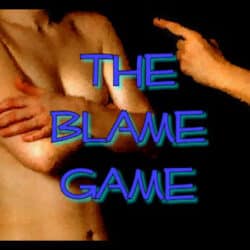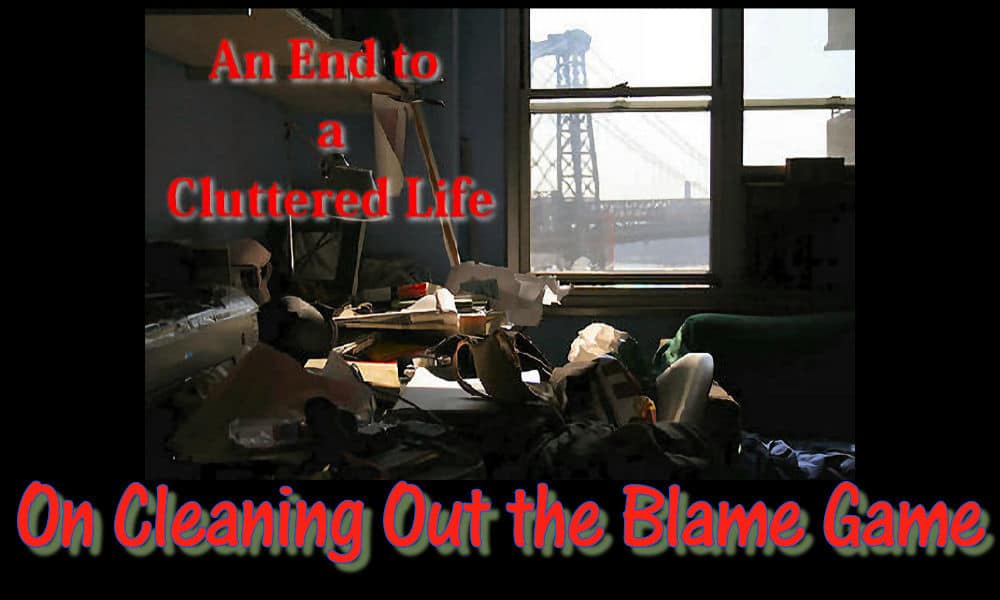Cleaning Out the Blame Game–There’s nothing particularly helpful about blame. And yet, it seems our minds revel in blame’s appeal. We fill our minds with slights, we tell ourselves how hard-done-by-we are, and we make ourselves victims of the past.
In this article, we look at cleaning out our minds — letting go of what does not work. From this ‘cleaned place,’ new choices emerge.

Living Life in Growing Orbits is our workbook.
52 weeks of daily exercises designed to help you figure yourself out.
Check out Living Life in Growing Orbits on our site.
Direct link to Amazon
Purchase digital versions (Apple, Nook, Kobo, etc.) from this page
It becomes so easy to get caught in the rut of repeating behaviours and activities that either do not work, or used to work and no longer do.
And yet, getting going with something else is tough, because inertia is a complicated thing

Cleaning out old ways of being is an intensive process. It seems to me that most people would prefer to simply change “locations or cast members.”
The problem with this “non-personal” approach is that somewhere between 6 weeks and 6 months, ‘the baggage arrives.’
All of the old, unresolved stuff re-emerges. Same stuff, different location. or context.
I just flashed on that scene in Monty Python’s “Holy Grail” movie.

Arthur confronts the Black Knight. A sword fight ensues. Arthur lops off the guy’s arm. “ ‘Tis only a flesh wound!”
Off goes the other arm, then one leg, then another. After each ‘lopping’ the Black Knight continues to yell and scream about how he’s going to slice Arthur to bits.
Arthur walks off in disgust, leaving a screaming torso in his wake.
You gotta ask yourself — how many limbs does one have to lose (metaphorically) before one is willing to shift the behaviour that caused it?
Here are a few things you could think about “cleaning out.”
1. Clean out blaming.

Nothing is happening to you, and no one is the cause of your difficulties.
So long as you think externals are ‘making’ you miserable, you’re going to stay deeply stuck.
Instead, think about and implement self-responsible, internal changes.
This will require that you actually look at how you are making yourself sick, miserable, off balance. This is, of course, hard work. It’s much easier to finger point.
If you want your life to be different, you must get your focus back to where it always belongs — on you and your internal dramas. From there, authentic choice is always possible.
2. Clean out guilt.

Being self-responsible means accepting that cause and effect (karma) exists.
If you yell at someone, they likely will react with anger (unless they read this blog, in which case they will laugh and suggest you get over yourself 😉 )
If you eat and drink junk, your body will soon let you know about it. If you don’t pay attention, you’ll trip over stuff.
Most people understand this karmic effect. They then immediately begin a guilt trip aimed at themselves. “You should know better. What an idiot!”
The joke is that they think this actually accomplishes something. Guilt is not noble. It’s blaming yourself, and then feeling self-righteous as you beat up on yourself.
Accepting responsibility is” “I did this, and got lousy results, all on my own. From now on, I’ll try other things.”
In other words, drop the guilt and do something different.
3. Clean out personal inertia.

Most of my clients were successful in their careers, less successful in their personal and relational lives.
When we talked, they’d tell me how busy they were, and how hard it was to ‘fit in’ a more centered, meditative, present way of living and being.
Most wanted a short-cut — a technique that they could ‘do.’
I demurred. The last thing I wanted to do is give another ‘doing’ to already over-busy people.
Besides, busyness is just another ploy to keep from changing the important stuff.
Instead, I recommend self-discipline — focusing deeply on the present moment, over and over again.
My recommendation: be present in the midst of your life.
Busyness is another excuse. It’s a variant of blaming. “How could I do anything over the holidays? IT was so busy!”
Where, you might ask, are all of your excuses getting you? It’s time to take complete responsibility for your ‘days,’ your direction, your actions, and your life.
4. Clean out your stories.

Most people are rigidly fixed on their version of their past.
They create an ‘abuse story’ and use it to continue to define themselves.
I do not deny that bad stuff has happened to people.
I’m just saying that living out the ‘abuse’ story for the next 20–50 years is a monumental waste of a life.
The whole point of good therapy is to come to a place of acceptance.
There is no way to change your past. No one ever has. It seems to me that what most people do with the past is continue to dredge it up, and then try to get others to admit that, indeed, it was ‘terrible.’
I’m just not sure what this accomplishes, other than to be sure you stay stuck in the past.
Do some therapy, and learn to ‘simply accept.’ This takes practice. However, acceptance means you can finally move on.
5. Clean out your fears.

Fears either define you, or are something you accept and transcend.
If you find that your first thought or sentiment is “I can’t do that!” your fears are dictating your life.
Get this: everyone is afraid of something. This is an element of our humanity.
But you’ll likely have noticed that most of the things you feared have never actually happened. That’s why bad stuff is still called an ‘accident.’
Fear helps us to notice that our body is not comfortable — fear is a ‘security warning.’ Fear ought to elicit our ‘proceed with caution’ program, not the ‘freeze like a deer caught in the headlights of a car’ reaction.
Find a way to confront your fear in the only functional way — proceed carefully to do something. Experiment. Push your fear boundary.
The common theme above is this: blaming gets us nowhere. Labeling ourselves and others is not particularly helpful, either. This year, watch your mind scramble to blame and name, have a little laugh, and let go of clinging to your mind’s chatter. Instead, play with simple, elegant, new ways of being.





